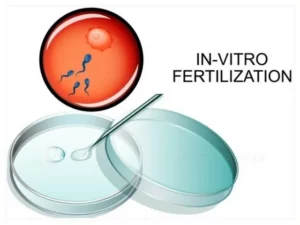Polycystic Ovary Syndrome (PCOS) is a common health condition that affects women of reproductive age, posing significant challenges, including infertility. This hormonal disorder can disrupt ovulation, making conception a daunting journey for many. However, hope is not lost. In this guide, we delve into the best infertility medications for PCOS, offering insights into how they work, their benefits, and side effects to consider.
Contents
Best Infertility Medications For PCOS
 Infertility in women with Polycystic Ovary Syndrome (PCOS) can be particularly challenging, but several medications have been found effective in managing this condition. Here are some of the best infertility medications used for PCOS:
Infertility in women with Polycystic Ovary Syndrome (PCOS) can be particularly challenging, but several medications have been found effective in managing this condition. Here are some of the best infertility medications used for PCOS:
Clomiphene Citrate (Clomid)
Clomiphene Citrate, commonly known as Clomid, is a widely used oral medication for inducing ovulation in women with PCOS. It functions by blocking estrogen receptors in the brain, particularly the hypothalamus. This blockage tricks the body into perceiving low estrogen levels, leading to increased production of follicle-stimulating hormone (FSH) and luteinizing hormone (LH). These hormones are essential for ovulation, as they stimulate the ovaries to produce and release eggs.
Metformin
Metformin is primarily known as a treatment for type 2 diabetes, but it’s also effective in managing symptoms of PCOS, including infertility. It works by improving the body’s sensitivity to insulin, which can be beneficial for women with PCOS who often have insulin resistance. By stabilizing insulin and blood sugar levels, Metformin can help in normalizing menstrual cycles and promoting ovulation. It is also beneficial for weight management. This can further improve fertility outcomes.
Letrozole (Femara)
Letrozole, originally used in breast cancer treatment, has gained popularity for treating infertility in PCOS. It’s an aromatase inhibitor, which means it works by decreasing the body’s estrogen production. As estrogen levels fall, the pituitary gland increases the production of FSH, thus stimulating the ovaries to produce one or more follicles. Studies have suggested that Letrozole might be more effective than Clomid, especially in women with PCOS. However, it is still considered an off-label use for fertility, meaning it’s not specifically approved for this purpose.
Gonadotropins
Gonadotropins are injectable hormones that directly stimulate the ovaries to produce multiple follicles. They are typically prescribed when a woman doesn’t respond to oral medications like Clomid or Letrozole. The treatment involves injecting FSH, LH, or a combination of both. While gonadotropins are more potent and can increase the chances of conceiving, they also come with a higher risk of side effects, including multiple pregnancies and ovarian hyperstimulation syndrome (OHSS).
In Vitro Fertilization (IVF)
 IVF is often considered when other treatments have not been successful. For women with PCOS, IVF involves stimulating the ovaries with fertility drugs to produce multiple eggs, which are then retrieved surgically. These eggs are fertilized with sperm in a laboratory, and one or more embryos are implanted in the woman’s uterus. IVF can be particularly effective for PCOS patients, as it bypasses many of the issues related to ovulation and egg quality.
IVF is often considered when other treatments have not been successful. For women with PCOS, IVF involves stimulating the ovaries with fertility drugs to produce multiple eggs, which are then retrieved surgically. These eggs are fertilized with sperm in a laboratory, and one or more embryos are implanted in the woman’s uterus. IVF can be particularly effective for PCOS patients, as it bypasses many of the issues related to ovulation and egg quality.
Inositol
Inositol, particularly in its forms Myo-inositol and D-chiro-inositol, has shown promise in managing PCOS. This natural supplement can help improve insulin resistance, a common issue in PCOS, and thereby aid in restoring normal ovulatory function. Inositol supplements have been found to improve menstrual regularity, ovarian function, and fertility in women with PCOS. They are often considered a more natural or alternative approach and can be used alongside traditional medical treatments.
It’s important to consult with a healthcare professional or a fertility specialist to determine the most appropriate treatment. This should be based on individual health status, severity of PCOS, and other factors like age and personal health history. Each treatment has its benefits and risks, and a medical professional can guide patients through these choices to find the best option for their specific situation.
How Many Months To Take Pills For PCOS?
The duration for taking medication for PCOS varies greatly depending on individual circumstances and treatment goals, especially when addressing infertility. Typically, medications like Clomiphene Citrate (Clomid) or Letrozole (Femara), which are used to induce ovulation, are initially prescribed for a course of three to six months. This duration allows sufficient time to assess the body’s response to the medication in terms of ovulation and potential pregnancy.
If ovulation is successfully induced but pregnancy doesn’t occur, the treatment might continue for several more cycles. However, the total duration rarely exceeds 12 months due to potential side effects and diminishing returns with prolonged use.
For other medications like Metformin, which are used to manage insulin resistance and other PCOS symptoms, the treatment duration can be much longer, even indefinite. Its use can extend beyond the immediate goal of achieving pregnancy, contributing to the long-term management of PCOS symptoms. Regular monitoring and adjustments are key components in the effective management of PCOS.
What Are The Benefits Of Infertility Medications?
 Infertility medications play a crucial role in assisting individuals and couples in overcoming challenges related to infertility. The benefits of these medications are multifaceted and can vary depending on the specific drug and the individual’s condition. Here are some of the primary benefits:
Infertility medications play a crucial role in assisting individuals and couples in overcoming challenges related to infertility. The benefits of these medications are multifaceted and can vary depending on the specific drug and the individual’s condition. Here are some of the primary benefits:
- Enhancing Ovulation
One of the main benefits of infertility medications, especially in women with conditions like PCOS, is the stimulation of ovulation. Drugs like Clomiphene Citrate (Clomid) and Letrozole (Femara) are designed to induce ovulation in women.
- Regulating Hormonal Imbalances
Many infertility issues stem from hormonal imbalances. Medications can help regulate hormones like estrogen, progesterone, FSH, and LH, creating a more favorable environment for conception.
- Increasing Sperm Production and Function
Infertility medications aren’t just for women; men can also benefit. Medications like gonadotropins can stimulate sperm production in men with certain types of infertility. Improved sperm count, motility, and quality can significantly enhance the chances of successful conception.
- Multiple Follicle Development
Injectable fertility drugs, such as gonadotropins, encourage the development of multiple follicles in the ovaries. This increases the number of eggs available for fertilization each cycle. Thereby enhancing the likelihood of pregnancy.
- Facilitating Timed Intercourse or Assisted Reproductive Techniques
Infertility treatments can be coordinated with timed intercourse or assisted reproductive techniques like intrauterine insemination (IUI) and in vitro fertilization (IVF). Medications help in preparing the body for these procedures, increasing their success rates.
- Psychological and Emotional Benefits
Infertility can be a significant source of stress and emotional distress. Effective treatment with infertility medications can offer hope and a sense of control to individuals and couples. And, improving their overall well-being and outlook on fertility.
It’s important to note that while infertility medications offer many benefits, they also come with potential risks and side effects. Therefore, they should be used under the guidance of a healthcare provider.
Side Effects Of Best Infertility Medications For PCOS
 Infertility medications, while effective in treating PCOS and associated infertility, can also have a range of side effects. The intensity and occurrence of these side effects can vary depending on the individual, the specific medication, and the dosage. Here are some common side effects associated with the best infertility medications for PCOS:
Infertility medications, while effective in treating PCOS and associated infertility, can also have a range of side effects. The intensity and occurrence of these side effects can vary depending on the individual, the specific medication, and the dosage. Here are some common side effects associated with the best infertility medications for PCOS:
- Gastrointestinal Issues
Medications like Metformin are known to cause gastrointestinal discomfort, which may include symptoms like nausea, vomiting, diarrhea, and abdominal bloating. These effects are typically most pronounced when starting the medication and may decrease over time.
- Mood Swings and Emotional Changes
Drugs that affect hormone levels, such as Clomiphene Citrate (Clomid) and Letrozole (Femara), can lead to mood swings, irritability, and emotional changes. These fluctuations are due to the alterations in hormone levels that these medications induce.
- Ovarian Hyperstimulation Syndrome (OHSS)
This is a potential side effect of fertility drugs, especially those that stimulate the ovaries, like gonadotropins. OHSS can cause swollen and painful ovaries, abdominal pain, and bloating. In severe cases, it can lead to more serious complications and requires immediate medical attention.
- Multiple Pregnancies
Fertility treatments, particularly those involving gonadotropins, increase the likelihood of multiple pregnancies (twins, triplets, etc.). While some may consider this a positive outcome, multiple pregnancies carry higher risks for both the mother and the babies, including preterm labor and delivery complications.
- Headaches and Fatigue
Some women experience headaches and general fatigue as side effects of fertility drugs. These symptoms can range from mild to severe and can impact daily activities.
- Weight Gain
Some women may notice weight gain when taking fertility medications. This can be due to water retention, changes in appetite, or other factors related to the medication.
- Breast Tenderness
Hormonal changes caused by fertility drugs can lead to breast tenderness or discomfort, similar to what some women experience during their menstrual cycle.
It’s important for individuals taking these medications to be closely monitored by their healthcare provider. If side effects are severe or persistent, the treatment regimen may need to be adjusted.
Conclusion
In conclusion, while PCOS can present significant challenges to fertility, there are numerous best infertility medications for PCOS and natural strategies that offer hope. From Clomiphene Citrate and Metformin to lifestyle changes and dietary adjustments, each option carries its own set of benefits and potential side effects. It’s important to remember that the journey to overcoming PCOS-related infertility is unique for each individual.
Hence, what works for one person may not work for another. With the right combination of treatments, many women with PCOS have been able to realize their dreams of parenthood. If you are facing PCOS-related issues, PCOS treatment at HerMantra can help. Book your free trial online pcos treatment session now.


